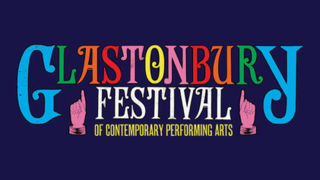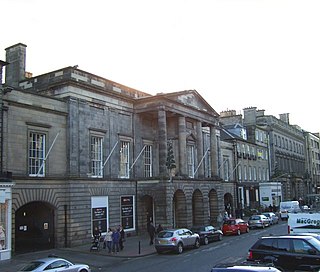
Glastonbury is a town and civil parish in Somerset, England, situated at a dry point on the low-lying Somerset Levels, 23 miles (37 km) south of Bristol. The town had a population of 8,932 in the 2011 census. Glastonbury is less than 1 mile (2 km) across the River Brue from Street, which is now larger than Glastonbury.

Glastonbury Festival is a five-day festival of contemporary performing arts held near Pilton, Somerset, England in most summers. In addition to contemporary music, the festival hosts dance, comedy, theatre, circus, cabaret, and other arts. Leading pop and rock artists have headlined, alongside thousands of others appearing on smaller stages and performance areas. Films and albums have been recorded at the festival, and it receives extensive television and newspaper coverage.
This is a list of notable events in music that took place in the year 1914.

Wesleyan College is a private, liberal arts women's college in Macon, Georgia, United States. Founded in 1836, Wesleyan was the first college in the world chartered to grant degrees to women.
Somerset is a county in the south-west of England. It is home to many types of music.
Rutland Boughton was an English composer who became well known in the early 20th century as a composer of opera and choral music. He was also an influential communist activist within the Communist Party of Great Britain (CPGB).

The Usher Hall is a concert hall in the West End of Edinburgh, Scotland. It has hosted concerts and events since its construction in 1914 and can hold approximately 2,200 people in its recently restored auditorium, which is well loved by performers due to its acoustics. The Hall is flanked by The Royal Lyceum Theatre on the right and The Traverse Theatre on the left. Historic Environment Scotland has registered the Hall with Category A listed building status.

The Tennessee Performing Arts Center (TPAC) is located in the James K. Polk Cultural Center at 505 Deaderick Street in downtown Nashville, Tennessee. It occupies a city block between 5th and 6th Avenues North and Deaderick and Union Streets. The cultural center adjoins the 18-story James K. Polk State Office Building.
The Immortal Hour is an opera by English composer Rutland Boughton. Boughton adapted his own libretto from the play of the same name by Fiona MacLeod, a pseudonym of writer William Sharp.
Glastonbury is a town in Somerset, England.

Cheltenham Town Hall is an early-20th century assembly rooms in Cheltenham, England. Unlike most town halls, it is a public venue and not the seat of the borough council, which is housed in the nearby Municipal Offices. It is a Grade II listed building.

Somerset is a county in the south west of England. It has a varied cultural tradition ranging from the Arthurian legends to The Wurzels, a band specialising in Scrumpy and Western music.
The first Glastonbury Festivals, most notable for being the forerunners of Glastonbury Festival, were a series of cultural events founded by communist activist and composer Rutland Boughton, which were held in summer from 1914 to 1925 in Glastonbury, Somerset, England.

The Assembly Rooms are meeting halls in central Edinburgh, Scotland. Originally solely a meeting place for social gatherings, it is now also used as an arts venue and for public events, including the Edinburgh Festival Fringe and the Hogmanay celebrations. There are four rooms, with moveable chairs or tables, that are used year-round and are available for private functions: Music Hall, Ballroom, Supper Room and Edinburgh Suite.

Dorothy (Ellen) Silk was an English soprano, who was associated both with early Baroque music and with contemporary British music, particularly the works of Rutland Boughton and Gustav Holst.

Church Hill Theatre is a Category B listed pink sandstone former church and current theatre venue owned by the Edinburgh City Council. Built originally as Morningside Free Church, the council purchased it in 1960. After undergoing an extensive refurbishment, it re-opened in August 2006. It is managed by the team operating the Assembly Rooms.
Penelope Spencer was an English dancer who is remembered for her modern approach to free-style dancing and choreography.
William Burdett-Coutts is the founder and director of theatre and comedy promotion company Assembly, one of the major venue operators at the Edinburgh Festival Fringe, the world's largest arts festival. He was the Chief Executive and Artistic Director of the Riverside Studios in London.
This is a summary of 1914 in music in the United Kingdom.
The Cheese and Grain is a live music and arts venue, and a community and education centre, in Frome, England. The main room has a capacity of over 800 people standing or 500 seated. Built in 1874 as a market hall, it has seen a number of changes of use in its history. The venue is the largest music venue in Somerset and has seen artists such as Joni Mitchell, Robert Plant and Joan Armatrading play there, whilst the Foo Fighters and Paul McCartney have played secret shows there in 2017 and 2022 respectively.